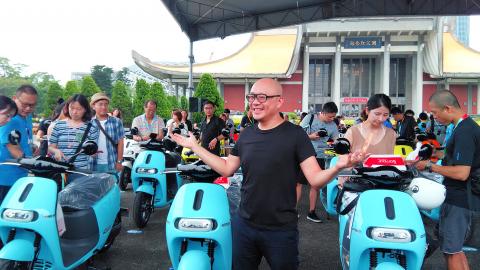Electric scooter maker Gogoro Inc (睿能創意) on Saturday said pre-orders for its Gogoro 2 series have set a company record.
Pre-orders for the scooters have surpassed 13,000 units as of the end of last month, after the company started taking orders on May 25, Gogoro cofounder and chief executive officer Horace Luke (陸學森) said.
He estimated that Gogoro, which last year sold nearly 13,000 scooters in Taiwan, will more than double its sales this year.

Photo: CNA
On Saturday, the first batch of Gogoro 2 scooters was delivered to customers at 34 locations around the nation. A handover event was held at the National Sun Yat-sen Memorial Hall, where 200 owners picked up their new vehicles.
An owner said he felt the new scooter had more torque than gasoline-powered scooters.
Changing batteries at swapping stations is also faster than refueling at a gasoline station, he added.
Gogoro operates nearly 400 battery-swapping stations around the nation and is to expand that number, Luke said.
The company has also signed agreements with 7-Eleven and the RT-Mart (大潤發) and Pxmart (全聯) hypermarket chains to set up battery-swapping stations at their outlets, he said.
The Gogoro 2 is priced at NT$73,800, but Taoyuan residents can purchase one for NT$38,800 thanks to subsidies offered by the Taoyuan City Government.
Luke said about 25 percent of Gogoro 2 buyers overall and more than 60 percent in Kaohsiung did so to replace their two-stroke scooters.
People replacing their two-stroke scooters are eligible for a government subsidy aimed at reducing air pollution caused by the gasoline-powered scooters.
This demonstrates the government’s determination to fight air pollution and shows that more people are trying out a new lifestyle, and identifying with Gogoro’s focus on “smart” transportation and energy, Luke said.
A total of 20,628 electric motorbikes were sold in Taiwan last year, according to Environmental Protection Administration statistics.
Of these, 62 percent were Gogoro scooters and 22 percent were made by China Motor Corp (中華汽車).
Overall, domestic motorbike sales rose 8.41 percent annually to 424,988 units in the first half of this year, according to data compiled by Taiwan Transportation Vehicle Manufacturers Association.
Kwang Yang Motor Co (光陽工業), the nation’s largest motorbike maker, reported sales of 156,979 units in the first six months, up 5 percent from a year earlier, with a 36.9 percent market share.
Sanyang Industry Co (三陽工業) the No. 2, sold 85,531 units, up 13.05 percent year-on-year, giving it a 20.1 percent market share.

CHIP RACE: Three years of overbroad export controls drove foreign competitors to pursue their own AI chips, and ‘cost US taxpayers billions of dollars,’ Nvidia said China has figured out the US strategy for allowing it to buy Nvidia Corp’s H200s and is rejecting the artificial intelligence (AI) chip in favor of domestically developed semiconductors, White House AI adviser David Sacks said, citing news reports. US President Donald Trump on Monday said that he would allow shipments of Nvidia’s H200 chips to China, part of an administration effort backed by Sacks to challenge Chinese tech champions such as Huawei Technologies Co (華為) by bringing US competition to their home market. On Friday, Sacks signaled that he was uncertain about whether that approach would work. “They’re rejecting our chips,” Sacks

NATIONAL SECURITY: Intel’s testing of ACM tools despite US government control ‘highlights egregious gaps in US technology protection policies,’ a former official said Chipmaker Intel Corp has tested chipmaking tools this year from a toolmaker with deep roots in China and two overseas units that were targeted by US sanctions, according to two sources with direct knowledge of the matter. Intel, which fended off calls for its CEO’s resignation from US President Donald Trump in August over his alleged ties to China, got the tools from ACM Research Inc, a Fremont, California-based producer of chipmaking equipment. Two of ACM’s units, based in Shanghai and South Korea, were among a number of firms barred last year from receiving US technology over claims they have

It is challenging to build infrastructure in much of Europe. Constrained budgets and polarized politics tend to undermine long-term projects, forcing officials to react to emergencies rather than plan for the future. Not in Austria. Today, the country is to officially open its Koralmbahn tunnel, the 5.9 billion euro (US$6.9 billion) centerpiece of a groundbreaking new railway that will eventually run from Poland’s Baltic coast to the Adriatic Sea, transforming travel within Austria and positioning the Alpine nation at the forefront of logistics in Europe. “It is Austria’s biggest socio-economic experiment in over a century,” said Eric Kirschner, an economist at Graz-based Joanneum

France is developing domestic production of electric vehicle (EV) batteries with an eye on industrial independence, but Asian experts are proving key in launching operations. In the Verkor factory outside the northern city of Dunkirk, which was inaugurated on Thursday, foreign specialists, notably from South Korea and Malaysia, are training the local staff. Verkor is the third battery gigafactory to open in northern France in a region that has become known as “Battery Valley.” At the Automotive Energy Supply Corp (AESC) factory near the city of Douai, where production has been under way for several months, Chinese engineers and technicians supervise French recruits. “They